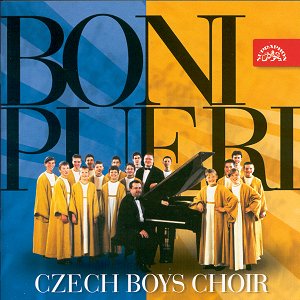There
is such charm about the way these ‘good boys’ from the Czech Republic
sing, making this disc a delightful experience, despite some quirky
aspects. The singing is straightforward, honest, with a tremendous
sense of enjoyment and often great beauty of tone. There is also
a disarming simplicity, a refreshing, unsophisticated quality,
so different from the sometimes overly self-conscious artistry
of English cathedral choirs. Standards here are very high, yet
the chief aim is communication of the music and of pleasure in
its performance.
The
programme is surprisingly wide-ranging, but there are some gems
in each of the sections. We begin with plainsong, moving on into
Renaissance and Baroque music. The engaging Lassus ‘echo’ number
is followed by a rousing Personent hodie, which has an
irresistible rhythmic lift to it. The ‘pop’ items, Panis Angelicus
and the Hallelujah chorus may be less interesting,
but I have to mention the excellent treble in the former, who
surely should be credited (Sample 1, track 4).
Of
the three Czech works, the Zelenka is easily the most interesting
– a grand Handelian utterance of great ingenuity and energy. It’s
a pity the booklet gives so little information; Vejvanovsky, for
example, is a fascinating figure, who, though a composer of considerable
skill, made his living principally as a trumpeter and music copyist.
His Monteverdian Confitebor receives a lively performance,
with stylish contributions from the instrumentalists of ‘Musica
florea’.
The
‘Dvořák’ number ‘Goin’ home’, a maudlin version of the New
World’s Largo melody, appears here in a rather lack-lustre
arrangement, with some very odd harmonies. The Czech folk-songs
and the opening chorus of the Bartered Bride (sample 2, track
10), on the other hand, receive convincing performances, reminding
me of how unusually beautiful is the sound of the Czech language.
Lovers of choral singing will particularly enjoy the ‘l’ sounds,
which the boys roll their tongues round with relish.
The
traditional numbers from around the world which form the next
group – from Australia, Argentina, Japan and Southern Africa -
are probably the most enjoyable part of the disc. This arrangement
of Waltzing Matilda is an especially good one, moving from
a quiet sentimental opening to a jazzy conclusion (Sample 3, track
13). The Czech pronunciation of the English (or should that be
‘Strine’?) is pleasantly hilarious, with words like ‘billabong’,
for example, coming out as ‘billabonk’. All adds to the fun! The
Zulu marching song Siyahamba is now a great favourite of
choirs in this country, and it’s given a splendid going over,
complete with drums and appropriate ululation.
The
Broadway medley with which the disc ends is not so wholly
convincing. If you are going to do music like this, you need excellent
arrangements; Chattanooga Choo-choo is fine, as are Hello
Dolly and Over the Rainbow. But the two Bernstein melodies
that complete the set are clumsily arranged, with lame harmonies
and incorrect melody lines (in America). This is unfortunate,
firstly because the boys actually sing them pretty well, and secondly
because it leaves one with a false impression at the CD’s conclusion.
No doubt the choir have issued this very eclectic compilation
with half an eye on encouraging touring possibilities. But these
items would have been best left out.
Nonetheless,
the overall standard is high, with a handful of numbers that are
quite wonderful. Though the recordings have been made in so many
different venues, this isn’t really a problem, and the quality
of balance etc. is extremely good. A mixed bag, then, in every
sense, but one with plenty of lovely things in it.
Gwyn
Parry-Jones


